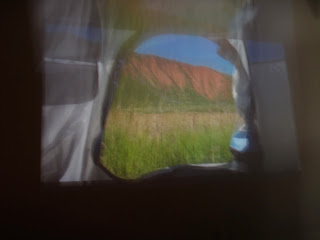Restless Arts
I watched this video for
total of about an hour or an hour and a half. But I am looking at it again
online. So I am writing this in the present tense.
A series of American vistas
framed by grey and blue nylon. Like Bernd and Hilla Becher you see the
variation because of what stays the same. What stays the same is the opening of
the tent, a sort of rounded square shape, irregular on one side where the door
flap is neatly tied. There are also two small rectangular windows in the two
top corners. After a few times through the almost seven minute loop you begin
to watch the landscape change through these subservient frames. Many of the
views are impressive. National
Parks of the West maybe. The vistas
are so sublime and the tent so…sporty. These two visual elements are share the
frame but are never reconciled exactly. I am reminded of the Gore-Tex-clad
portraits of Karel Funk, the natural and synthetic butting up against each
other.
The first several locations
are likely camping spots: flat, dry, high ground. Then, the tent hovers just
above a flowing river; we know this is a departure from the reality of camping.
The tone is not quite serious, or not quite taking itself seriously. A sign
reads “NO camping beyond this point”
then the tent faces a chain link fence that guards a drop off (No camping
beyond this point). A dog looks into the tent. There is a man with a metal
detector on the beach. These shots are somehow funny.
When the tent begins to drag
backward we know for sure we have departed from any likely camping scenario. This
becomes more than a sequence of views from a pitched tent. It is implausible
(you don’t usually move a tent more than a few feet this way) It also resembles
the view of a person being held under the arms and dragged. It’s a helpless or
wounded posture. Or it’s the point of view of an inanimate object.
At one point the tent
swivels abruptly, correcting the view from one framed tree to two. At this
moment the opening of the tent most resembles the viewfinder of a video camera
on a tripod. Does the video address camping or making art? Are they
related? Are they parallel? Is it
making an analogy? The camper sets up the tent, chooses the direction it faces
conscious of the light, the view. The artist sets up the lens with some of the
same criteria. But the element of dragging the view proposes a puzzle I cant
quite complete. Which is probably good.
And Restless. What is the
restlessness named in the title? Do people camp out of restlessness? I don’t
think so, even if they change locations frequently. Maybe this is the
restlessness that propels a person who enjoys both camping and recording but is
unable to settle in and enjoy either process. Or maybe, and most interestingly, restlessness is not a
driving force but a dragging force that moves it all impatiently in the
opposite direction of the ideal view.
EF
EF

No comments:
Post a Comment